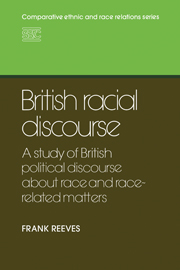Book contents
- Frontmatter
- Contents
- List of figures and tables
- Acknowledgments
- Objectivity
- Introduction
- 1 The meaning of ‘racism’: its limitations when applied to the study of discourse dealing with race relations
- 2 The meaning of ‘ideology’ and its relationship to discourse
- 3 The economic foundations of racial division
- 4 The state, levels of political articulation, and the discourse of the Conservative and Labour Parties
- 5 British political values and race relations
- 6 The nature of discoursive deracialisation
- 7 Deracialised justifications: a case study (an analysis of the parliamentary debates on immigration)
- 8 Conclusion: ideology and British race relations
- Appendix 1 Nomenclature
- Appendix 2 Ideological eristic
- Appendix 3 Examples from colonial history of discoursive deracialisation
- Appendix 4 Further examples of popular sanitary coding
- Bibliography and references
- Name index
- Subject index
Appendix 3 - Examples from colonial history of discoursive deracialisation
Published online by Cambridge University Press: 05 November 2011
- Frontmatter
- Contents
- List of figures and tables
- Acknowledgments
- Objectivity
- Introduction
- 1 The meaning of ‘racism’: its limitations when applied to the study of discourse dealing with race relations
- 2 The meaning of ‘ideology’ and its relationship to discourse
- 3 The economic foundations of racial division
- 4 The state, levels of political articulation, and the discourse of the Conservative and Labour Parties
- 5 British political values and race relations
- 6 The nature of discoursive deracialisation
- 7 Deracialised justifications: a case study (an analysis of the parliamentary debates on immigration)
- 8 Conclusion: ideology and British race relations
- Appendix 1 Nomenclature
- Appendix 2 Ideological eristic
- Appendix 3 Examples from colonial history of discoursive deracialisation
- Appendix 4 Further examples of popular sanitary coding
- Bibliography and references
- Name index
- Subject index
Summary
Discoursive deracialisation is not a new phenomenon. Huttenback (1976, p. 21) offers us a number of examples from nineteenth-century British white colonial policy arising from the conflict of two sets of principles:
On the one hand marched the concept of what Burke had called ‘the natural equality of mankind at large’ which, under the influence of nineteenth-century liberal humanitarianism and the evangelical movement, had turned into the concept of trusteeship and the imperial philosophy of a nonracial empire, all of whose subjects were equal before the law. Emerging on the other hand was the determination of the British settlers in South Africa, Australia, New Zealand, and Canada that theirs must be a ‘White Man's Country’.
One way to reconcile the desire to exclude non-whites from the colonies and the philosophy of the Empire was to pursue policies racialist in effect but to justify them non-racially.
In response to the 1854 anti-Chinese demonstrations in Australia in which the Chinese were ‘injured, their property destroyed and their claims appropriated as they were driven from the mining communities’, an ingenious way of limiting Asiatic immigration was devised (either intentionally or by accident). The Duke of Newcastle ‘purported to be concerned about the conditions under which Chinese travelled to Australia’ and suggested that legislation be introduced imposing penalties ‘on all ships bringing immigrants to New South Wales in which it might appear that a sufficient proportion of space had not been allotted to the Emigrants or an adequate issue of provision made regularly to them throughout the voyage or that the Ship had left China in an unseaworthy state’.
- Type
- Chapter
- Information
- British Racial DiscourseA Study of British Political Discourse About Race and Race-related Matters, pp. 263 - 264Publisher: Cambridge University PressPrint publication year: 1983



